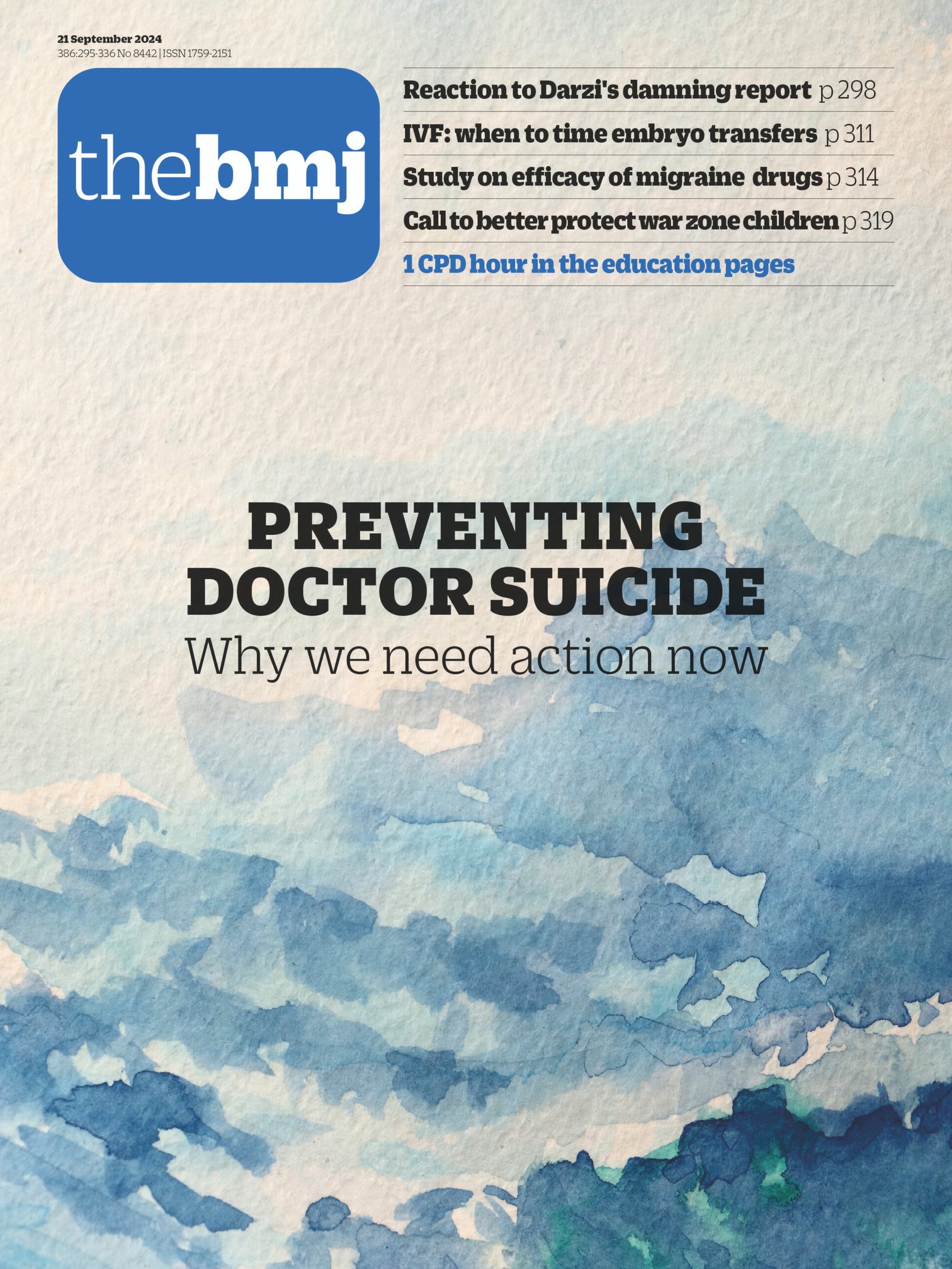
- John P A Ioannidis, professor1 2,
- Michael Berkwits, former JAMA deputy editor3,
- Annette Flanagin, executive managing editor4,
- Theodora Bloom, executive editor5
1Meta-Research Innovation Center at Stanford, Stanford University, Stanford, California, USA
2Department of Medicine, Stanford University School of Medicine, Stanford, California, USA
3Chicago, Illinois, USA
4JAMA and the JAMA Network, Chicago, Illinois, USA
5The BMJ, London, UK
- Correspondence to: A Flanagin annette.flanagin{at}jamanetwork.org
In September 2023, we announced the 10th international congress on peer review and scientific publication, to be held in Chicago, Illinois, on 3-5 September 2025.1 We now officially call for abstract submissions.
The aim of the congress continues to be inspired by the original goal of the inaugural session in 19892,3: to encourage research into the quality and credibility of peer review and scientific publication and to further the evidence base on which scientists can improve the conduct, reporting, and dissemination of scientific research. Nearly everything else has changed around that mission, as we recently described.1 The effects of artificial intelligence (AI) and large language model (LLM) technologies are currently shaping an unpredictable landscape. The rise of mega-journals,4 challenges to reproducibility,5 ever evolving incentives for publication,6,7 old and new types of misconduct,891011 and countless other developments accompany evolving shifts in the scientific environment. These shifts are not well covered by existing scholarly publication practices and policies. Such evolving changes warrant empirical descriptions and investigation into their effects and possible adverse effects on the scientific enterprise.
As with all previous congresses, next year’s event will feature three days of presentations of original research about these and other topics that are vital to the processes, policies, problems, and innovations of peer review, scientific publication, and research dissemination. The congress programme will be largely determined by the abstracts we receive from researchers, representing the current and evolving interests and work of global scientific communities. We encourage new ideas and rigorous evaluations of both old and new processes, and give priority to novel, data driven studies. We also encourage studies that build on previous related research. We are less interested in previously published studies unless there are new insights derived from new unpublished analyses.
The box gives examples of topics of interest, and we will consider any novel research relevant to the funding, conduct, editorial and peer review, reporting, analysis and interpretation, and dissemination of scientific and scholarly information. We have a continued special interest in studies of bias of all sorts and how biases can be identified and managed, ranging from methodological and analytical biases in reports of research to concerns about diversity, inclusion, and representativeness of research participants, authors, peer reviewers, and editors. We are also interested in studies that evaluate if and how AI and LLM technologies have altered the landscape of science and publishing since their public upsurge just after the last congress in 2022.12,13 The world was emerging from the SARS-CoV-2 pandemic then, and we proposed that the contentious and challenging interface between science, society, and policy created an opportune time to test, challenge, and improve the standards of peer review and scientific publication.14 The promise and perils of science and the broader society that supports it seem no less volatile now, if for different reasons, and we again hope that the evolution of technologies and opportunities will lead to novel research that can be presented and discussed during the 10th congress and that the gatekeepers and systems of scientific production and dissemination will be even more receptive to informed change.
We will consider a broad range of study designs but give preference to well developed studies with more generalisable results (eg, prospective, multiyear trials and controlled studies from collaborative researchers, journals, publishers, funders, and information disseminators). Retrospective studies, systematic reviews, meta-analyses, bibliometric and other data analyses, surveys, modelling studies, and other types of studies will also be considered. Abstracts describing non-systematic narrative reviews, recommendations, or opinions will not be considered.
We particularly encourage interdisciplinary research and work that aims to provide valuable insights across diverse scientific fields, including (but not limited to) biomedicine, health and life sciences, psychology, applied sciences, basic sciences, physical and chemical sciences, mathematics, computer sciences, engineering, economics, and social sciences. Work in new and emerging disciplines on technologies and interventions related to publication systems and peer review are also welcome.
Presenters and attendees typically include editors and publishers of scientific peer reviewed journals, researchers, funders, bibliometric and informatics experts, information innovators, librarians, journalists, policy makers, ethicists, scientific information producers and disseminators, and anyone interested in the progress of the scientific information enterprise and the quality of scientific evidence across all scientific and scholarly disciplines. Everyone is invited to submit research for consideration and to attend.
The abstract submission site will open on 1 December 2024, and the deadline for submission is 31 January 2025. Instructions for preparing and submitting abstracts and programmes and abstracts of research presented at the previous congresses9 are available on the peer review congress website.15 Additional information and future announcements will be available on the website, via email alerts that can be signed up for on the site, and the Peer Review Congress social media posts.
The peer review congress is organised by us with support from JAMA and the JAMA Network, The BMJ, and the Meta Research Innovation Center at Stanford (METRICS) and is supported by associate directors and an advisory board of leaders in research and publication who represent a wide variety of scientific disciplines.16
We are excited to receive abstracts for consideration for the 10th international congress on peer review and scientific publication.
Topics of interest for the 10th international congress on peer review and scientific publication*
Bias
-
Efforts to avoid, manage, or account for bias in research methods, design, conduct, analysis, and reporting and interpretation
-
Publication and reporting bias
-
Bias on the part of researchers, authors, reviewers, editors, funders, commentators, influencers, disseminators, and consumers of scientific information
-
Interventions to address gender, race and ethnicity, geographical location, career stage, and discipline biases in peer review, publication, research dissemination, and impact
-
Improving and measuring diversity, equity, and inclusion of authors, reviewers, editors, and editorial board members
-
Motivational factors for bias related to rewards and incentives
-
New forms of bias introduced by wider use of large language models and other forms of artificial intelligence (AI)
Editorial and peer review decision making
-
Assessment and testing of models of peer review and editorial decision making and workflows used by journals, publishers, funders, and research disseminators
-
Evaluations of the quality, validity, and practicality of peer review and editorial decision making
-
Challenges, new biases, and opportunities with mega-journals
-
Assessment of practices related to publication of special issues with guest editors
-
Economic and systemic evaluations of peer review technology and workflows and the related publishing business sector
-
Methods for ascertaining use of large language models and other forms of AI in authoring and peer review of scientific papers
-
AI in peer review and editorial decision making
-
Quality assurance for reviewers, editors, and funders
-
Editorial policies and responsibilities
-
Editorial freedom and integrity
-
Peer review of grant proposals
-
Peer review of content for meetings
-
Editorial handling of science journalism
-
Role of journals as publishing venues v peer review venues
-
Covid-19 pandemic and post-pandemic effects
Research and publication integrity and ethics
-
Ethical concerns for researchers, authors, reviewers, editors, publishers, and funders
-
Authorship, contributorship, accountability, and responsibility for published material
-
Conflicts of interest (financial and nonfinancial)
-
Research and publication misconduct
-
Editorial nepotism or favouritism
-
Paper mills
-
Citation cartels, citejacking, and other manipulation of citations
-
Conflicts of interest among those who critique or criticise published research and researchers
-
Ethical review and approval of studies
-
Confidentiality considerations
-
Rights of research participants in scientific publication
-
Effects of funding and sponsorship on research and publication
-
Influence of external stakeholders: funders, journal owners, advertisers/sponsors, libraries, legal representatives, news media, social media, fact checkers, technology companies, and others
-
Tools and software to detect wrongdoing, such as duplication, fraudulent manuscripts and reviewers, image manipulation, and submissions from paper mills
-
Corrections and retractions
-
Legal issues in peer review and correction of the literature
-
Evaluations of censorship in science
-
Intrusion of political and ideological agendas in scientific publishing
-
Science and scientific publication under authoritarian regimes
Improving research design, conduct, and reporting
-
Effectiveness of guidelines and standards designed to improve the design, conduct, analysis, and reporting of scientific studies
-
Evaluations of the methodological rigour of published information
-
Data sharing, transparency, reliability, and access
-
Research reanalysis, reproducibility, and replicability
-
Approaches for efficient and effective correction of errors
-
Curtailing citation and continued spread of retracted science
-
Innovations in best, fit-for-purpose methods and statistics, and ways to improve their appropriate use
-
Implementations of AI and related tools to improve research design, conduct, and reporting
-
Innovations to improve data and scientific display
-
Quality and reliability of data presentation and scientific images
-
Standards for multimedia and new content models for dissemination of science
-
Quality and effectiveness of new formats for scientific articles
-
Fixed articles v evolving versions and innovations to support updating of scientific articles and reviews
Models for peer review and scientific publication
-
Single anonymous, double anonymous, collaborative, and open peer review
-
Pre-study conduct peer review
-
Open and public access
-
Embargoes
-
Preprints and prepublication posting and release of information
-
Prospective registration of research
-
Post-publication review, communications, and influence
-
Engaging statistical and other technical expertise in peer review
-
Evaluations of reward systems for authors, reviewers, and editors
-
Approaches to improve diversity, equity, and inclusion in peer review and publication
-
Innovations to address reviewer fatigue
-
Scientific information in multimedia and new media
-
Publication and performance metrics and usage statistics
-
Financial and economic models of peer reviewed publication
-
Quality and influence of advertising and sponsored publication
-
Quality and effectiveness of content tagging, markup, and linking
-
Use of AI and software to improve peer review, decision making, and dissemination of science
-
Practices of opportunistic, predatory, and pirate operators
-
Threats to scientific publication
-
The future of scientific publication
Dissemination of scientific and scholarly information
-
New technologies and methods for improving the quality and efficiency of, and equitable access to, scientific information
-
Novel mechanisms, formats, and platforms to disseminate science
-
Funding and reward systems for science and scientific publication
-
Use of bibliometrics and alternative metrics to evaluate the quality and equitable dissemination of published science
-
Best practices for corrections and retracting fraudulent articles
-
Comparisons of and lessons from various scientific disciplines
-
Mapping of scientific methods and reporting practices and of meta-research across disciplines
-
Use and effects of social media
-
Misinformation and disinformation
-
Reporting, publishing, disseminating, and accessing science in emergency situations (pandemics, natural disasters, political turmoil, wars)
Footnotes
-
This article is being published simultaneously in The BMJ and JAMA.
-
Competing interests: We have read and understood BMJ policy on declaration of interests and declare that all authors serve as directors of the peer review congress. AF is an unpaid board member for STM: International Association of Scientific, Technical, and Medical Publishers. TB is a founder of medRxiv, a member of the board of managers of American Institute of Physics Publishing, and on the governance council of the Canadian Medical Association Journal.
-
Provenance and peer review: Commissioned; not externally peer reviewed.






